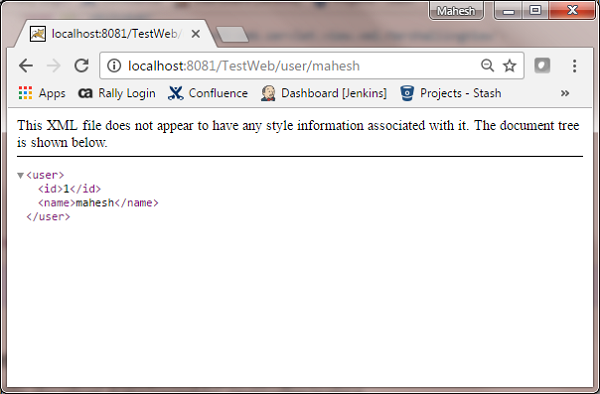📌 相关文章
- Spring MVC-生成JSON示例
- Spring MVC-生成JSON示例(1)
- Spring MVC-生成Excel示例(1)
- Spring MVC-生成Excel示例
- Spring MVC-生成PDF示例(1)
- Spring MVC-生成PDF示例
- spring mvc (1)
- Spring MVC-Xml视图解析器示例(1)
- Spring MVC-Xml视图解析器示例
- spring mvc - 任何代码示例
- spring mvc - Java 代码示例
- spring mvc - Java (1)
- spring xml - Java 代码示例
- spring xml - Java (1)
- Spring MVC-密码示例(1)
- Spring MVC-密码示例
- Spring MVC-隐藏字段示例
- Spring MVC-隐藏字段示例(1)
- spring mvc 项目示例 - Java (1)
- Spring MVC-复选框示例(1)
- Spring MVC-复选框示例
- Spring MVC-复选框示例
- Spring MVC-复选框示例(1)
- Spring – MVC 验证
- Spring MVC验证(1)
- Spring – MVC 验证(1)
- Spring MVC验证
- Spring MVC教程(1)
- Spring MVC教程(1)
📜 Spring MVC-生成XML示例
📅 最后修改于: 2020-11-11 06:35:34 🧑 作者: Mango
以下示例显示了如何使用Spring Web MVC Framework生成XML。首先,让我们拥有一个运行良好的Eclipse IDE,并遵循以下步骤使用Spring Web Framework开发基于动态表单的Web应用程序。
| Step | Description |
|---|---|
| 1 | Create a project with a name TestWeb under a package com.tutorialspoint as explained in the Spring MVC – Hello World chapter. |
| 2 | Create Java classes User and UserController under the com.tutorialspointpackage. |
| 3 | The final step is to create the content of the source and configuration files and export the application as explained below. |
User.java
package com.tutorialspoint;
import javax.xml.bind.annotation.XmlElement;
import javax.xml.bind.annotation.XmlRootElement;
@XmlRootElement(name = "user")
public class User {
private String name;
private int id;
public String getName() {
return name;
}
@XmlElement
public void setName(String name) {
this.name = name;
}
public int getId() {
return id;
}
@XmlElement
public void setId(int id) {
this.id = id;
}
}
UserController.java
package com.tutorialspoint;
import org.springframework.stereotype.Controller;
import org.springframework.web.bind.annotation.PathVariable;
import org.springframework.web.bind.annotation.RequestMapping;
import org.springframework.web.bind.annotation.RequestMethod;
import org.springframework.web.bind.annotation.ResponseBody;
@Controller
@RequestMapping("/user")
public class UserController {
@RequestMapping(value="{name}", method = RequestMethod.GET)
public @ResponseBody User getUser(@PathVariable String name) {
User user = new User();
user.setName(name);
user.setId(1);
return user;
}
}
TestWeb-servlet.xml
在这里,我们创建了一个XML映射的POJO用户,并在UserController中返回了该User。 Spring根据RequestMapping自动处理XML转换。
完成创建源文件和配置文件后,导出应用程序。右键单击您的应用程序,使用“导出”→“ WAR文件”选项,然后将您的TestWeb.war文件保存在Tomcat的webapps文件夹中。
现在,启动Tomcat服务器,并确保您能够使用标准浏览器从webapps文件夹访问其他网页。尝试使用URL – http:// localhost:8080 / TestWeb / mahesh ,我们将看到以下屏幕。
